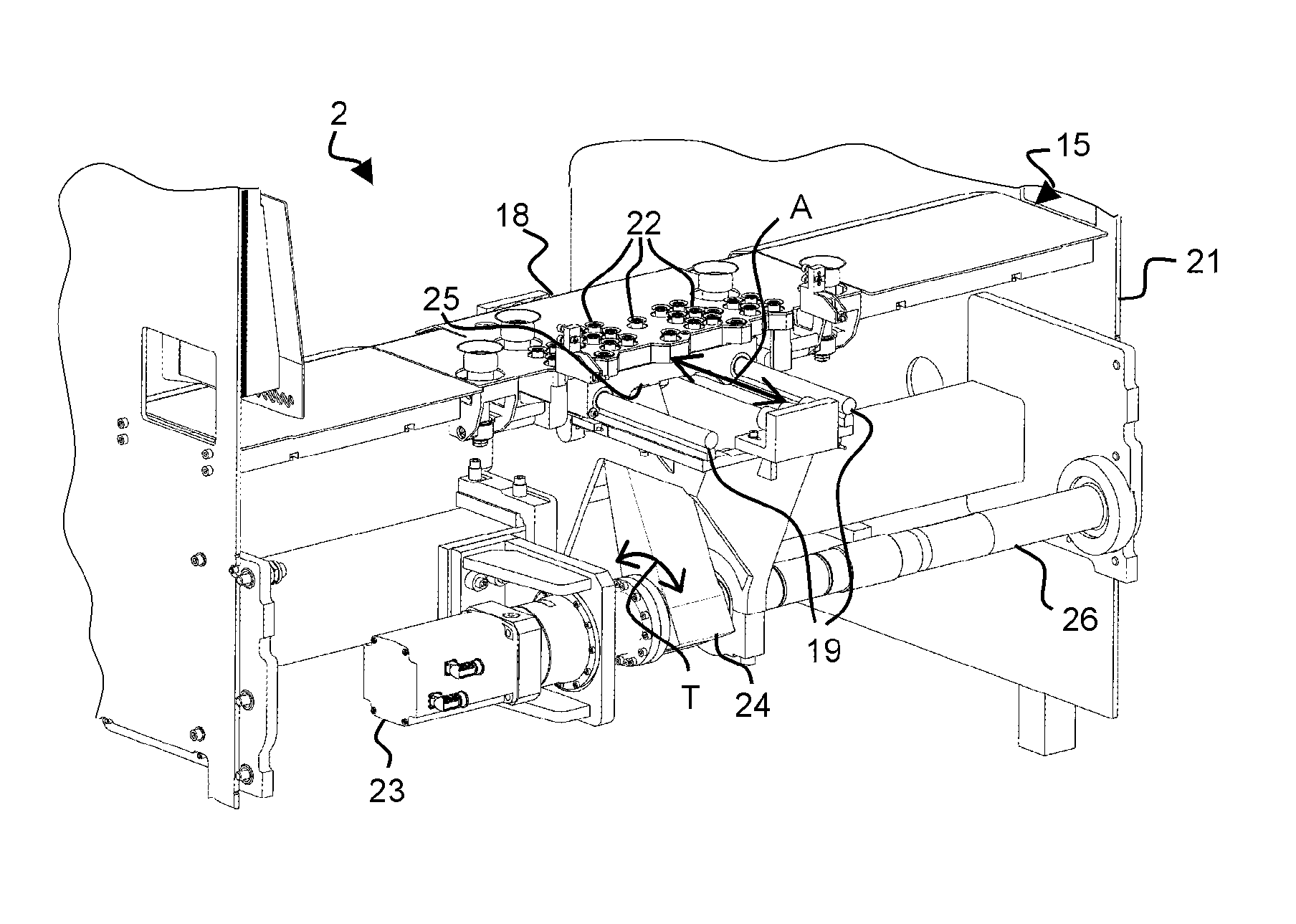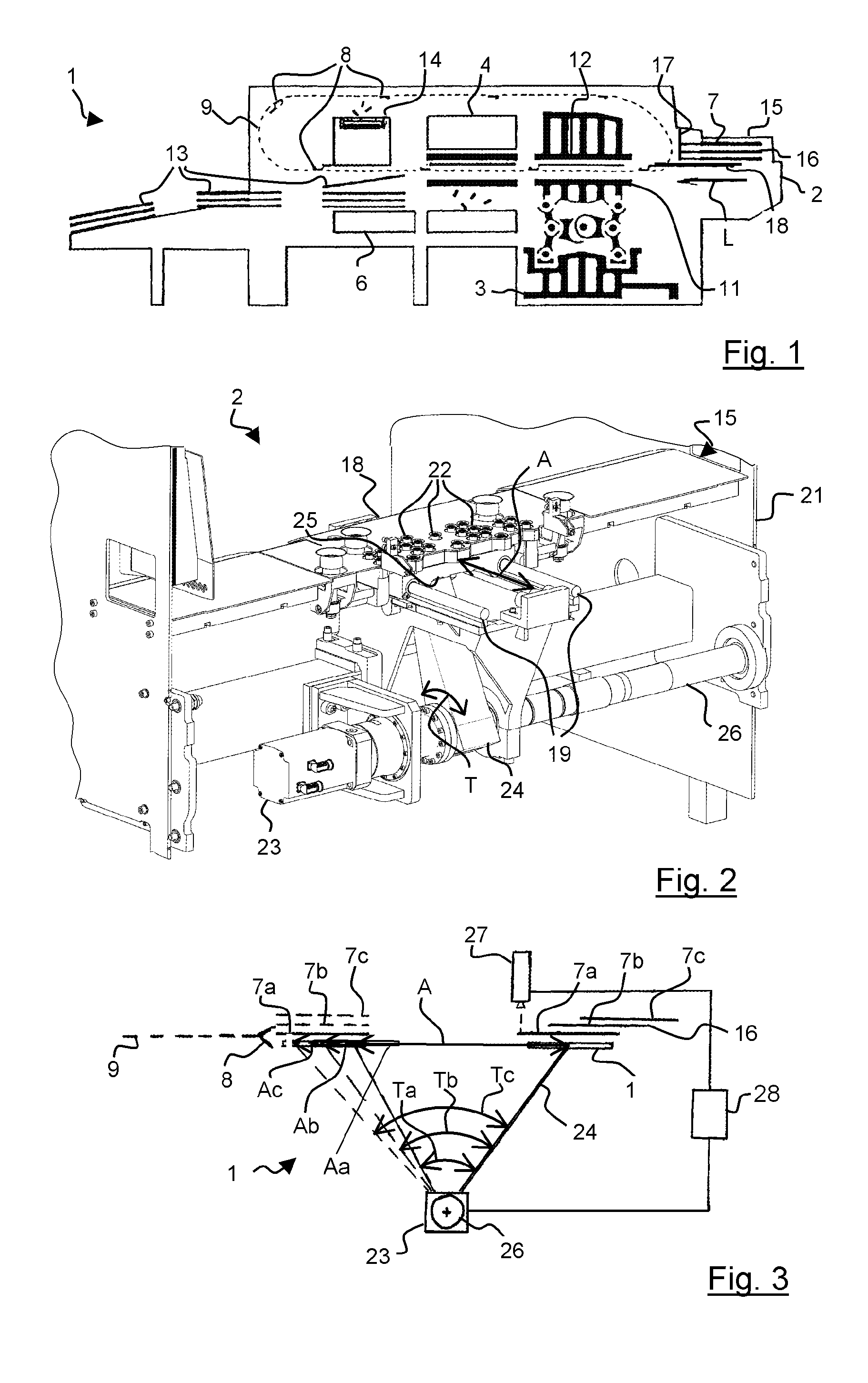Device for positioning a plate element in an infeed station of a processing machine
a technology for processing machines and plate elements, applied in the field of devices, can solve the problems of limiting the possible rate of running the plate elements in the machine, forming a fairly damaged zone of the plate element, and affecting the processing efficiency of the machin
- Summary
- Abstract
- Description
- Claims
- Application Information
AI Technical Summary
Benefits of technology
Problems solved by technology
Method used
Image
Examples
first embodiment
[0046]In a first embodiment and advantageously, the infeed device (18) may be in the form of a shelf that can move longitudinally (A). The shelf can favorably slide longitudinally (A) on two lower longitudinal slides (19) mounted on a frame (21).
[0047]In a first variant of the first embodiment, the shelf (18) may have suction holes (22) connected to a vacuum source (not shown), to pick up the sheets to be cut (7) by their lower face. Means for controlling vacuum suction are also provided to release the sheet to be cut (7) at the accurate moment when the gripper bar (8) grips it.
[0048]The positioning device (15) then comprises a motor (23) moving the infeed device (18) longitudinally (A) from the upstream position to the downstream position, and vice-versa, depending on the rated running of the press (1). The motor (23) of the infeed device (18) is positionally slaved according to the rated running of the gripper bar chains (9) of the press (1), usually detected by the angle of the o...
second embodiment
[0058]In a second embodiment, the temporary holding means for the sheets to be cut (7) may be in the form of a vacuum conveyor with endless belts driven by the motor, for example substantially similar to those described in the document EP-0,501,213. These types of temporary holding means comprise a suction chamber with one face perforated by many suction holes and which is connected to a vacuum source such as a vacuum suction pump. A set of endless conveyor bands or belts are guided and driven by pulleys located at the front and rear ends of the chamber and pass along the perforated face of the chamber to return to the opposite face.
[0059]The motor controlled according to the invention drives one of the end pulleys. The sheets to be cut (7) are thus laid by suction against the endless belts and then brought at an accurate intermediate position to be gripped there by the gripper bar (8). The distance of movement of the sheets to be cut (7) is a function of their starting longitudinal...
third embodiment
[0060]In a third embodiment, the temporary holding means for the sheets to be cut (7) may be in the form of a vacuum conveyor with rollers driven by the motor, for example substantially similar to those described in the document EP-0.363.662. These types of temporary holding means comprise a frame constituted with two beams connected together by a series of crossmembers. These side beams support, in integrated bearings, a series of shafts parallel with one another at right angles to the direction of movement of the sheets to be cut (7). These shafts have a series of drive rollers carved from the block. A plate covers the lower face of the frame, except at rectangular openings through which the lower portion of the rollers passes, which thus emerge from the plate.
[0061]The motor controlled according to the invention drives the shafts and thus the rollers. The sheets to be cut (7) are thus laid by suction against the rollers, and then brought at an accurate intermediate position to be...
PUM
 Login to View More
Login to View More Abstract
Description
Claims
Application Information
 Login to View More
Login to View More - R&D
- Intellectual Property
- Life Sciences
- Materials
- Tech Scout
- Unparalleled Data Quality
- Higher Quality Content
- 60% Fewer Hallucinations
Browse by: Latest US Patents, China's latest patents, Technical Efficacy Thesaurus, Application Domain, Technology Topic, Popular Technical Reports.
© 2025 PatSnap. All rights reserved.Legal|Privacy policy|Modern Slavery Act Transparency Statement|Sitemap|About US| Contact US: help@patsnap.com


